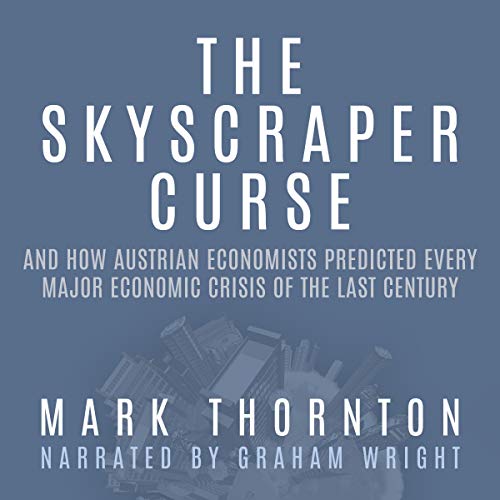
The Skyscraper Curse: And How Austrian Economists Predicted Every Major Economic Crisis of the Last Century
Échec de l'ajout au panier.
Échec de l'ajout à la liste d'envies.
Échec de la suppression de la liste d’envies.
Échec du suivi du balado
Ne plus suivre le balado a échoué
0,99 $/mois pendant vos 3 premiers mois
 Exclusivité Prime: 2 titres
gratuits à choisir pendant l'essa. Des conditions s’appliquent.
Exclusivité Prime: 2 titres
gratuits à choisir pendant l'essa. Des conditions s’appliquent.
Acheter pour 25,00 $
Aucun mode de paiement valide enregistré.
Nous sommes désolés. Nous ne pouvons vendre ce titre avec ce mode de paiement
-
Narrateur(s):
-
Graham Wright
-
Auteur(s):
-
Mark Thornton
À propos de cet audio
The Skyscraper Curse is Dr. Mark Thornton's definitive work on booms and busts, and it explains why only Austrian economists really understand them. It makes business cycle theory accessible to a whole new 21st-century audience. And they need it, especially those under 40.
Many of the brilliant quants working on Wall Street and at the Fed barely remember the Crash of 2008, much less understand it. But Mark Thornton does, and his book is a warning about overheated equity markets, overinflated housing prices, and clueless central bankers. Given the shaky stock markets lately, 2018 may be the year the Fed’s latest bubble bursts. And when it does, it will be even more painful than 10 years ago. In fact, US household and business debt is now $1 trillion higher than in 2008.
Mark is well known as an expert on bubbles and Fed malfeasance. His work appears in outlets like Wall Street Journal, Bloomberg, Forbes, The Economist, Barron’s, and Investor’s Business Daily. His now-infamous Skyscraper Index theory draws the connection between loose monetary policy, artificially low interest rates, and vanity construction projects. Put the three together and it doesn’t turn out well.
And let’s not forget that Dr. Thornton was among only a handful of economists to warn about the dangerous housing bubble in 2004, and again in 2006. Cabbies and waiters bought up condos with no money down in places like Las Vegas. Prices rose 25 percent or more every year in some coastal markets. Even people with terrible credit financed houses at five or seven times their annual income. All of it was made possible by the Fed and its mania for low interest rates. So when the experts said, “Nobody could have seen this coming,” the Mises Institute had Mark’s articles and papers ready to go. The housing crash, and the meltdown in equity markets less than a year later, were thoroughly explained by Austrian business cycle theory. And Mark was the capable face of the Mises Institute during it all.
Without a lay-friendly book like The Skyscraper Curse, millions more Americans will be duped by the next crash. Dr. Thornton’s book tells the story that needs to be told. It will be among the only alternative explanations available when the next crisis comes.
©2018 Ludwig von Mises Institute (P)2018 Ludwig von Mises Institute


